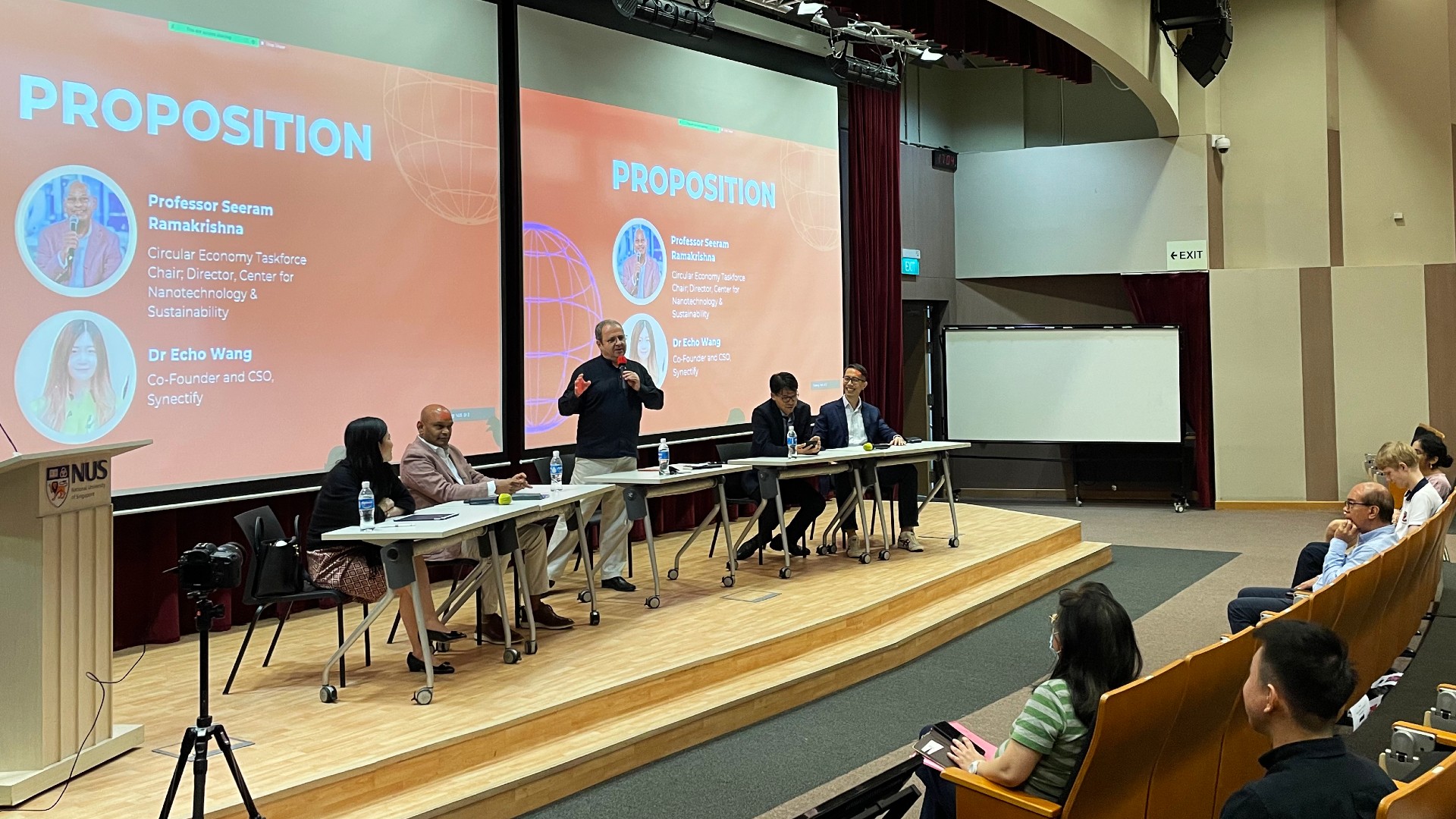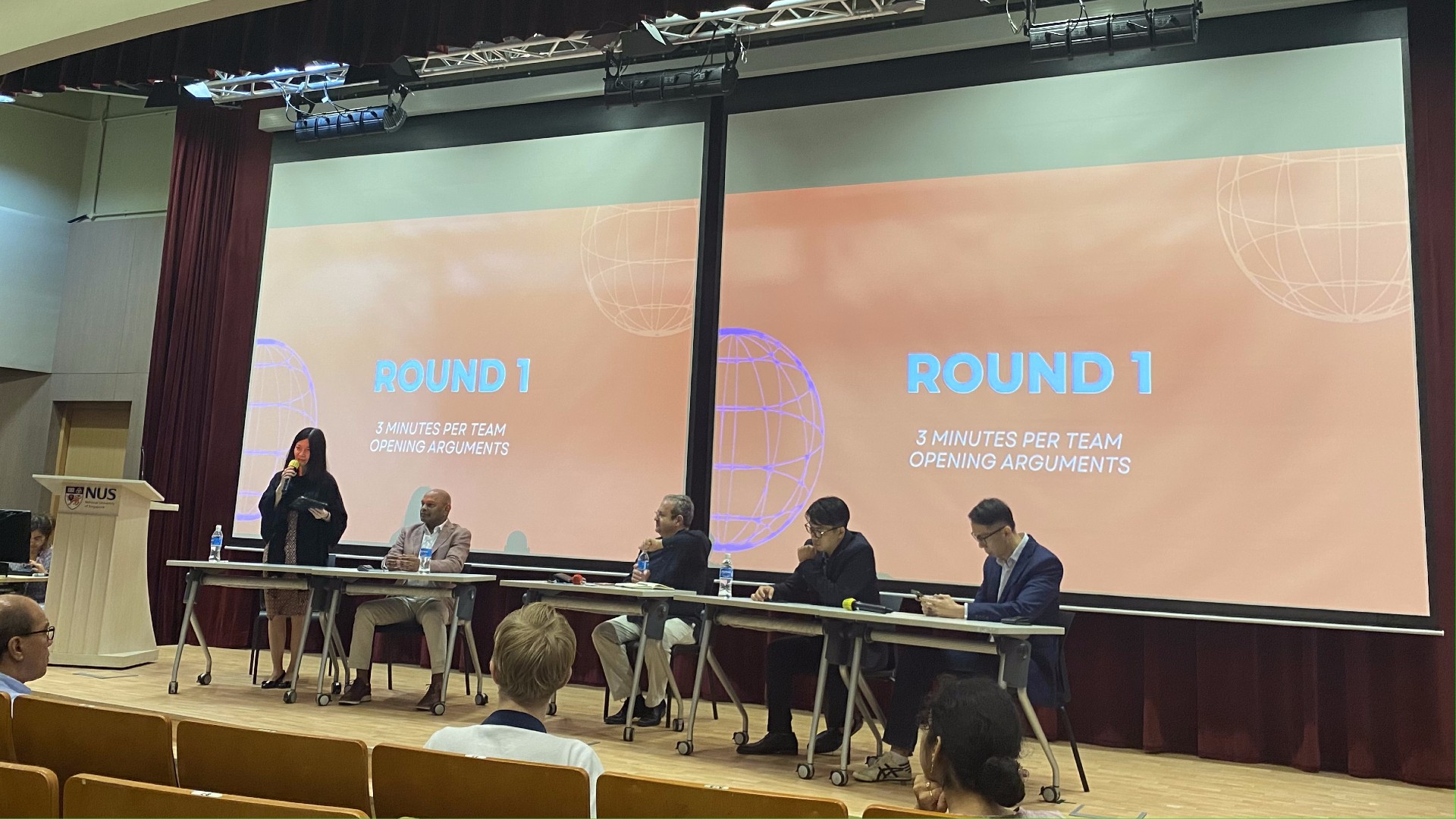Hope and fear: Debating innovation for climate action
From extreme weather events and weakening food security to the loss of biodiversity, the ill-effects of climate change have become more globally visible in recent years. A major question that has arisen in public consciousness is whether countries will be able to come together in time to enact the kind of far-reaching, systematic changes needed to meaningfully mitigate climate change.
This was the focus of a recent Oxford-style debate organised by Innovation with Societal Impact (ISI), a cross-division team within NUS Enterprise that drives Innovation & Enterprise (I&E) efforts to address environmental, social and sustainability-related issues. The debate brought together educators, policymakers and entrepreneurs in the sustainability field to explore the following proposition: “The world can innovate fast enough to reverse the effects of climate change”.
Held on 23 September, it was among a week-long slate of events planned by ISI to raise awareness, foster community, and enhance dialogue surrounding climate action issues, in conjunction with Singapore Climate Action Week 2022.
To set the stage for the lively exchange of views, Professor Low Teck Seng, Senior Vice President (Sustainability and Resilience) at NUS, highlighted in his opening speech that Singapore is committed to harnessing research and development and technological innovations to tackle climate change. In this regard, the University plays an important role in addressing key sustainability challenges through research and education, while NUS Enterprise provides a platform for the University’s theoretical research findings to be translated into products, processes, and services for the good of the environment and society.
Starting the debate off for the proposition, Dr Echo Wang argued that innovation has always empowered and propelled humanity forward to bring about positive changes in society. Drawing from her experience as co-founder of Synectify, a technology start-up focused on carbon offsetting that was incubated at The Hangar by NUS Enterprise and supported by the NUS Graduate Research Innovation Programme (GRIP), Dr Wang said: “Innovative technologies are already helping to reduce emissions by changing current energy use patterns, or by increasing energy efficiency and conservation.”
Dr Wang also pointed out that innovation in today’s world goes beyond technology. Citing the 2015 Paris Climate Accords as “policy innovation on a global scale”, Dr Wang highlighted that similar policy innovations like carbon taxes and emission targets, as well as social innovations developed by social entrepreneurs such as carbon calculators, are already helping to mobilise and organise people and resources towards a more climate-conscious society.
Supporting Dr Wang’s proposition, Professor Seeram Ramakrishna from the Department of Mechanical Engineering at the NUS College of Design and Engineering and Chairman of the NUS Circular Economy Taskforce, contended that history has shown how humans have a boundless capacity to be creative and to innovate. Over centuries, humans have overcome the challenges of surviving on earth through creating, sharing, and transferring new knowledge. A case in point is the recent COVID-19 pandemic which precipitated innovations in many areas – scientific, political, commercial, and social, among others – aimed at mitigating the ill-effects of the global crisis.
Countering the proposition’s arguments, Professor Johan Sulaeman, Director of NUS’ Sustainable and Green Finance Institute and Dean’s Chair and Associate Professor in the Department of Finance at NUS Business School, underscored the inherent difficulties involved in translating innovative ideas into actual concrete outcomes to combat climate change, arguing that “the world lacks the mass commitment – be it social, political, or financial commitment – to get these outcomes delivered.” He also noted the challenges of undertaking climate actions that will not inadvertently harm society’s most vulnerable populations. Rebutting the proposition’s point on COVID-19, Prof Sulaeman added that the pandemic has led to an increase in societal distrust in governments and governmental institutions, meaning it may now be harder to convince the public to accept social and policy innovations related to climate change that are being rolled out by governments worldwide.
Speaking second for the opposition, Mr Tay Kae Fong, a NUS alumnus who was in the pioneer batch of NUS Overseas Colleges (2003-2004), cautioned that climate change is a complex issue and one that cannot rely solely on the belief in human resilience and creativity. As an entrepreneur who founded Greenway Revolution, a technology solutions provider focused on driving the circular economy, he shared about the cost factors that disincentivise many businesses from adopting greener technologies. He stressed that without accompanying action from legislators and consumers, the status quo would remain.
“We cannot be complacent and just rely on the innovators, entrepreneurs or intrapreneurs to take action – because of the sheer scale of the problem, all of us in our own way need to step up to address and mitigate climate change,” Mr Tay added.

After an hour of robust exchanges and a brief Q&A segment, the winning team was decided via an audience poll. The opposition team eventually emerged victorious by garnering 85 per cent of the audience vote, with many audience members agreeing that tackling climate change should be an all-of-society effort, and not just the responsibility of innovators and entrepreneurs alone.
By NUS Enterprise
A video recording of the debate is available here.






